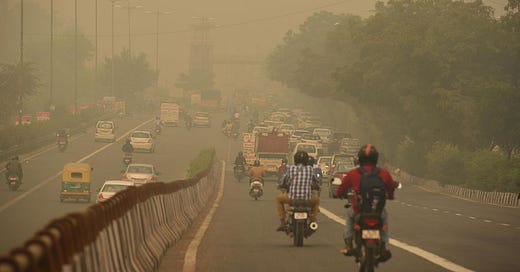
The Free Press

During the first months of the pandemic, in the spring of 2020, India’s government imposed one of the most draconian lockdowns anywhere in the democratic world. I happened to be in Mumbai at that time, where you couldn’t go more than half a mile from your home except for essential purposes. Unpleasant as this was, there was one positive side effect: the notoriously polluted skies of Mumbai—like those of other big Indian cities, from Delhi to Bangalore—suddenly became much clearer. With far fewer cars on the road, factories shut, and flights grounded, the amount of aerosols in the atmosphere fell to their lowest rate in 20 years.
Then came the negative side effect. That summer, India experienced some of the hottest temperatures ever recorded. Globally, the year 2020 was one of the warmest on record; the average temperature in India that year was 0.29 Celsius degrees hotter (roughly 0.52 degrees Fahrenheit) than during 1981–2010.
This is no coincidence. It is well known that aerosols make clouds bigger, brighter, and more reflective; when they decrease, more sunlight reaches the earth, which leads to higher temperatures. And a 2023 study showed how, during the pandemic, clearer skies across South Asia increased climate warming.
As we clean up the environment, we must be conscious of this trade-off. I was reminded of my lockdown in India a few weeks ago, when it was reported that an attempt to cleanse one of the world’s most polluting industries has, unfortunately, exacerbated global warming.
In January 2020, new shipping regulations were put in place by the International Maritime Organization, to reduce the permissible sulfur content of shipping fuel from 3.5 percent to 0.5. The intended effect was to reduce the sulfur dioxide emitted by maritime vessels by about 80 percent; the actual reduction was about 70 percent. The IMO’s expectation was that this would lead to “reductions in stroke, asthma, lung cancer, cardiovascular and pulmonary diseases.”
“Cutting sulphur emissions from ships will also help prevent acid rain and ocean acidification, benefitting crops, forests, and aquatic species.”
But according to a study released last month, the “abrupt reduction in shipping emission” had an unintended consequence. Sulfur dioxide has a powerful cooling effect on the planet, because it reacts with water vapor to produce aerosols, which help block the sun.
Led by Tianle Yuan, a scientist at the University of Maryland and NASA, this latest study therefore found that cutting emissions from shipping could warm the atmosphere by 0.16 degrees Celsius within a decade. (Aerosols vanish quickly from the atmosphere.) The 2020s are expected to be “anomalously warm”—and we already know that the year 2023 was the hottest on record.
“There is a trade-off between reducing aerosol pollution and additional warming,” Yuan told me. The well-known climate scientist James Hansen refers to this trade-off as a “Faustian bargain.”
“In terms of policy,” Yuan added, “we need a better understanding of the pros and cons of the impact on human health and climate/environment.” It is far more difficult to quantify the health benefits from the reduction of aerosols than it is to measure the additional global warming.
Yuan’s findings have been challenged, notably by Zeke Hausfather, a climate scientist at the Breakthrough Institute. “Yuan and colleagues are not too far off on the ultimate amount of warming that will result from the regulations,” he told me. “They just assume it will happen nearly immediately rather than over the course of decades as the ocean heats up.”
Importantly, he isn’t challenging the magnitude of warming that Yuan predicts as a result of these shipping regulations, but rather how quickly the warming will come about.
“More sophisticated models give a much smaller effect (0.05° C to 0.07° C or so) in 2023 than the 0.16° C they suggest in the paper,” he said.
There are other effects of reducing aerosols in the atmosphere. If you live in North America, you’ve probably noticed an uptick in wildfires in recent years. A recent study from the University of California, Riverside finds that reducing aerosols may increase wildfires—even more than a rise in greenhouse gases—because, it is thought, aerosol mitigation dries out plants more than greenhouse gases do, making them more flammable.
So, does all this mean we shouldn’t stop polluting? Is there some sense in which pollution is “good”? Should we actually inject aerosols into the atmosphere to slow down global warming—as some have suggested?
No, we shouldn’t go that far. Yangyang Xu, a professor of atmospheric sciences at Texas A&M University, told me: “The health benefits of cutting air pollution outweigh the negative impact of accelerating global warming.
“There is no basis for continuing polluting the air for the sake of ‘masking’ some global warming.”
This is especially true, he added, in heavily polluted countries such as China and India, where there is considerable loss of life every year due to respiratory illnesses.
The general consensus in the scientific community is that if we focus on reducing aerosols without also reducing greenhouse gases, global warming will only accelerate, so we need to channel our resources into eliminating both simultaneously. But when it comes to environmental concerns, aerosols may be a lesser evil—one that might even buy us time until we work out how to get other emissions under control.
Rupa Subramanya is a reporter for The Free Press. Follow her on X @rupasubramanya and read her piece “Stop Making Plane Turbulence About Climate Change.”
To support The Free Press, become a Free Press subscriber today:















The planet has been cooling and warming (think ice ages) since it came into existence. The effects of human activities plays a minuscule role.
Ooh, how fun! It looks like they're prepping us for the acceptance of spraying aerosols in the air, from planes, to save the planet from global warming. Then, once the general public accepts the need, they'll admit that, yes, they've been doing it for years, to save the planet.
Of course, anyone who's pointed out these streaks of white emissions that have been trailing behind planes for the past 20+ years and spreading across the skies for hours afterwards were calling them "chem-trails". Anyone who dared to believe our lying eyes were conspiracy theorists. How silly of us, we just didn't have the right terminology!
The gas-lighting that the general public has received, in the claims that these things simply don't exist (or were just the same condensation trails that have always trailed behind planes) will now turn into the gas-lighting of, "of course we've been doing everything we could to save the planet, we've never denied that!"